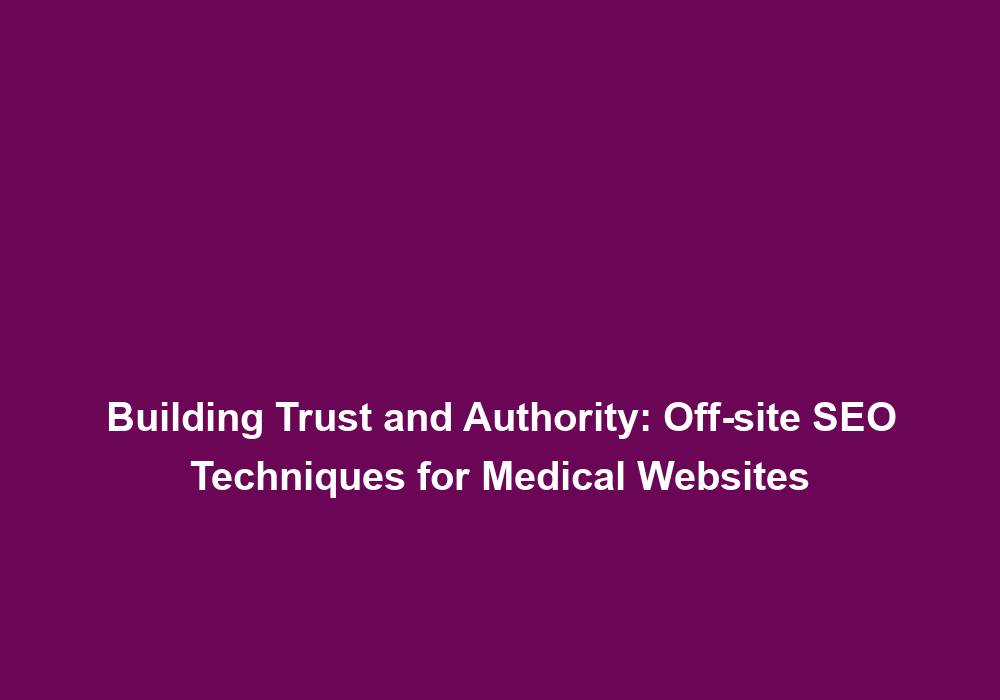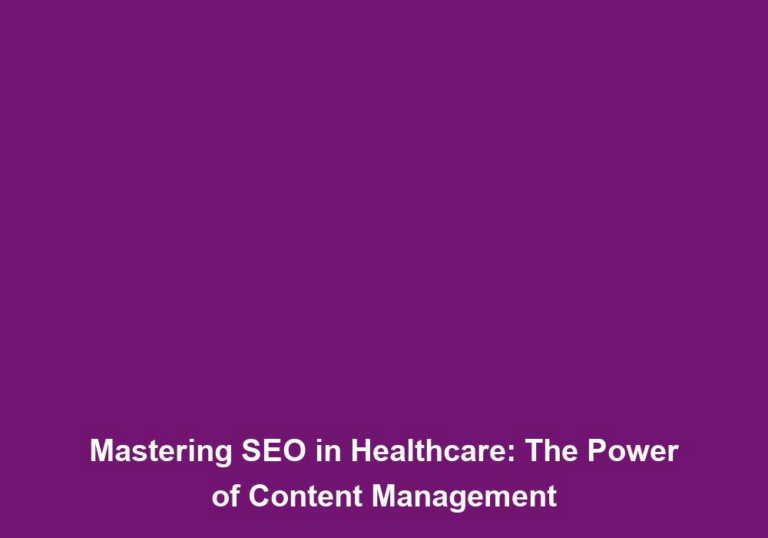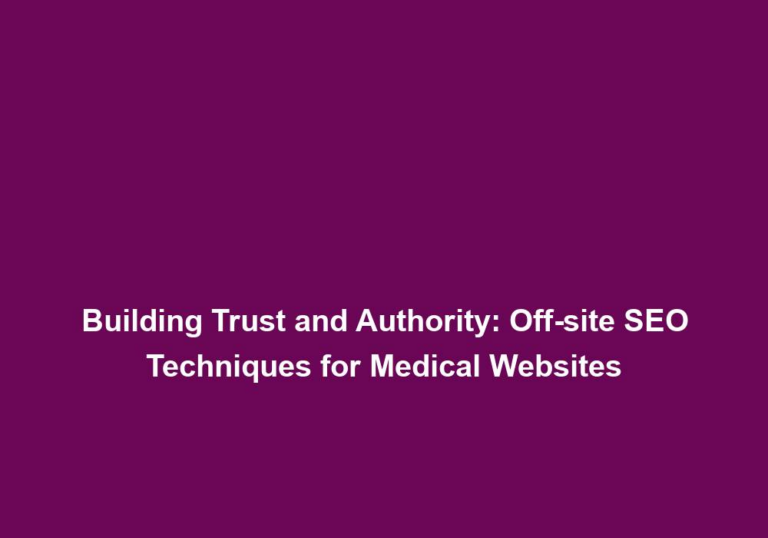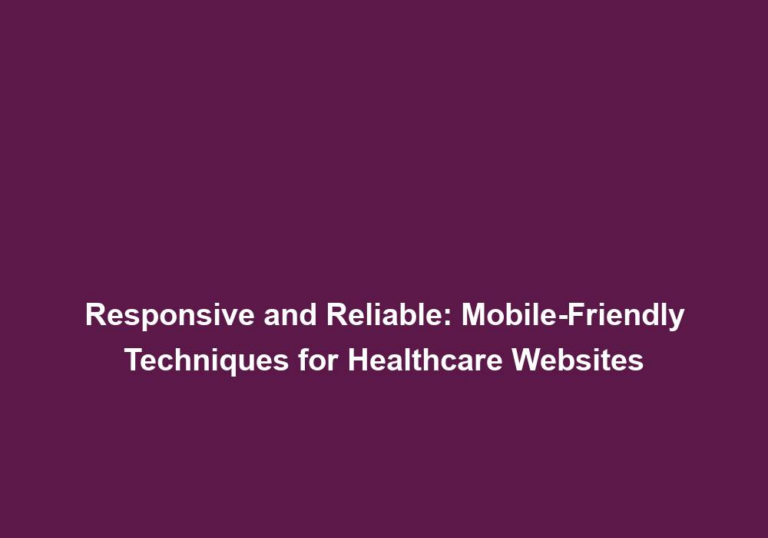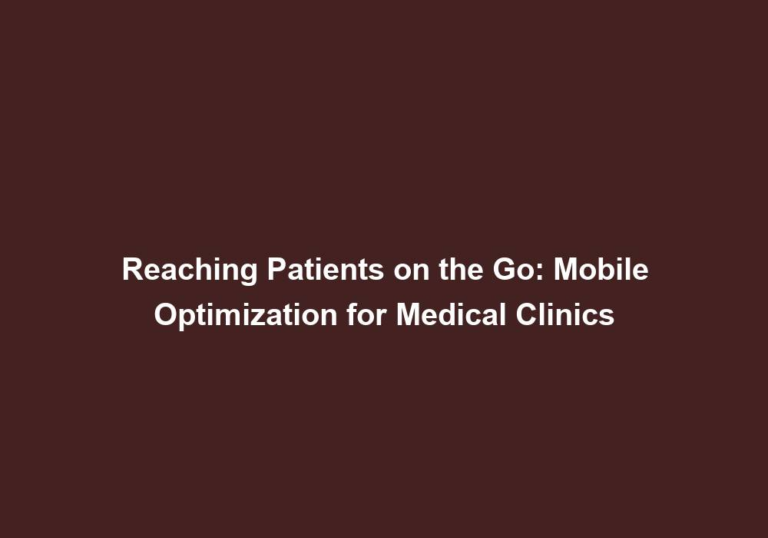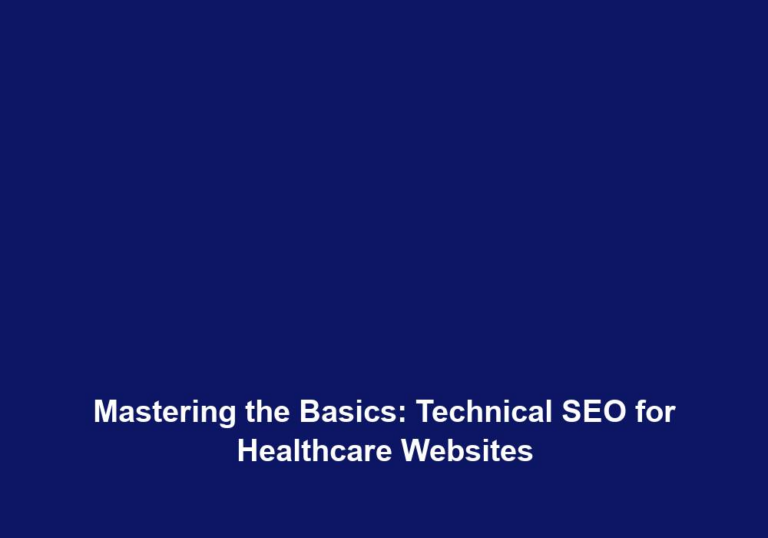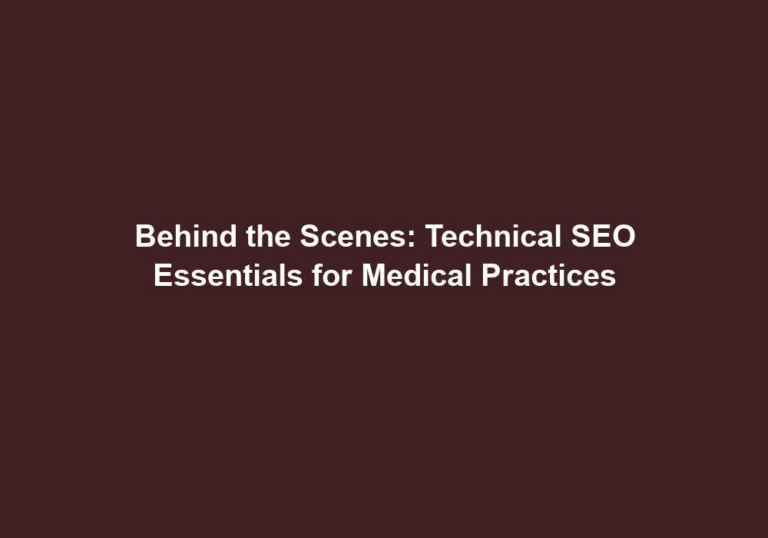Expanding Digital Reach: Off-site SEO Strategies for Healthcare
In the ever-evolving digital landscape, it is essential for healthcare organizations to develop effective off-site SEO strategies to expand their digital reach. Off-site SEO refers to the actions taken outside of your website to improve its visibility and search engine rankings. By implementing these strategies, healthcare providers can attract more organic traffic, increase brand awareness, and enhance their online presence. In this article, we will delve into several off-site SEO strategies tailored specifically for the healthcare industry.
1. Leverage the Power of Quality Backlinks
Backlinks play a crucial role in off-site SEO, as they indicate to search engines that your website is reputable and trustworthy. Healthcare organizations should focus on acquiring high-quality backlinks from authoritative sources in the industry. This can be achieved through various methods, such as:
- Collaborating with influential bloggers or healthcare professionals to generate valuable content that includes links back to your website. By working together with these industry experts, you can create informative articles, guest posts, or interviews that provide valuable insights to your audience and establish your website as a credible source of information.
- Engaging in guest blogging opportunities on reputable healthcare websites, allowing you to showcase your expertise and gain relevant backlinks. By contributing high-quality articles to these websites, you can not only increase your backlink profile but also attract new visitors who are interested in your healthcare services.
- Participating in healthcare forums and online communities, where you can share valuable insights while including links to your website when appropriate. By actively participating in these platforms, you can position yourself as an authority in the healthcare industry and drive traffic to your website through relevant discussions and interactions.
Remember, the quality of backlinks matters more than the quantity. Aim for backlinks from reputable websites with high domain authority to maximize the impact on your off-site SEO efforts. Additionally, diversify your backlink profile by acquiring links from various sources to ensure a well-rounded and natural link profile.
2. Build a Strong Social Media Presence
Social media platforms have become powerful tools for healthcare organizations to connect with their target audience and improve their online visibility. By utilizing social media effectively, you can extend your reach and engage with potential patients. Here are some strategies to consider:
- Create and maintain active profiles on popular social media platforms such as Facebook, Twitter, Instagram, and LinkedIn. By having a presence on these platforms, you can reach a wider audience and establish a direct line of communication with your target demographic.
- Share informative and engaging content related to healthcare trends, tips, and news to establish yourself as a thought leader in the industry. By providing valuable information to your followers, you can build trust and credibility, which can lead to increased brand recognition and patient loyalty.
- Encourage user-generated content by actively responding to comments, reviews, and inquiries from your audience. By engaging with your followers, you can foster a sense of community and encourage them to share their experiences, testimonials, and feedback, which can further enhance your online presence.
- Collaborate with influencers in the healthcare field to promote your brand and increase your social media following. By partnering with influencers who have a significant following and influence in the healthcare industry, you can leverage their reach to expand your own audience and gain exposure to potential patients.
Remember to optimize your social media profiles by using relevant keywords, including links to your website, and ensuring consistent branding across all platforms. Consistency in posting frequency and content quality is also key to maintaining an active and engaging social media presence.
3. Online Directories and Local Listings
Getting listed in online directories and local listings is an effective off-site SEO strategy for healthcare providers looking to improve their digital reach. These directories and listings not only increase your online visibility but also enhance your credibility. Consider the following steps:
- Claim and optimize your profiles on popular healthcare directories such as Healthgrades, WebMD, and Zocdoc. By claiming your profiles, you can ensure that the information displayed is accurate and up-to-date, making it easier for potential patients to find and contact your healthcare organization.
- Ensure that your business information, including your name, address, and phone number (NAP), is consistent across all directories and listings. Consistency in NAP information is crucial for search engines to properly index and rank your website, as conflicting information can lead to confusion and lower search engine rankings.
- Encourage satisfied patients to leave positive reviews on these platforms, as they can greatly impact your online reputation. Positive reviews not only attract potential patients but also signal to search engines that your healthcare organization is trustworthy and reliable, leading to improved search engine rankings.
By leveraging online directories and local listings, you can make it easier for potential patients to find and connect with your healthcare organization. Additionally, regularly monitor these directories to ensure that the information is accurate and up-to-date.
4. Collaborate with Influencers and Industry Experts
Influencer marketing has gained significant traction in recent years, and healthcare providers can benefit from collaborating with influencers and industry experts to expand their digital reach. Consider the following strategies:
- Identify influencers and experts in the healthcare industry who align with your brand values and target audience. Look for individuals who have a large following, engage with their audience, and share valuable insights related to healthcare.
- Establish relationships with these individuals by offering them opportunities to contribute guest posts, participate in interviews, or share their expertise on your website or social media platforms. By featuring these influencers and experts on your platforms, you can tap into their existing audience and gain exposure to a wider demographic.
- Leverage the influence of these individuals to increase brand awareness and drive targeted traffic to your website. Encourage them to promote your healthcare organization through social media posts, blog articles, or even collaborations on webinars or events. By leveraging their influence, you can increase your online visibility and attract potential patients who trust the recommendations of these influencers.
Remember to choose influencers and industry experts who have a genuine interest in healthcare and can provide valuable insights to your audience. Building strong relationships with these individuals can lead to long-term collaborations and mutual benefits.
5. Monitor Online Reputation and Reviews
Maintaining a positive online reputation is crucial for healthcare organizations, as potential patients often rely on reviews and ratings when choosing a provider. Monitoring your online reputation allows you to address any negative feedback promptly and showcase your commitment to patient satisfaction. Consider these steps:
- Set up alerts or use reputation management tools to monitor mentions of your brand, healthcare providers, and services across various online platforms. By staying informed about what is being said about your healthcare organization, you can quickly respond to any negative feedback or address any issues that may arise.
- Respond to both positive and negative reviews in a timely and professional manner. Thank patients for their positive feedback and address any concerns or issues raised in negative reviews. By engaging with patients and showing that you value their feedback, you can build trust and credibility.
- Encourage satisfied patients to leave reviews and ratings on reputable review platforms, as this can impact your search engine rankings. Positive reviews not only attract potential patients but also signal to search engines that your healthcare organization is highly regarded, leading to improved visibility in search results.
By actively monitoring your online reputation, you can ensure that potential patients perceive your healthcare organization positively. Addressing any negative feedback promptly and showcasing your commitment to patient satisfaction can help build trust and attract more patients to your practice.
In conclusion, expanding digital reach through off-site SEO strategies is crucial for healthcare providers aiming to thrive in the digital age. By implementing quality backlinks, building a strong social media presence, leveraging online directories, collaborating with influencers, and monitoring online reputation, healthcare organizations can enhance their online visibility, attract more organic traffic, and ultimately drive growth in their digital presence. Stay proactive and continuously adapt to the evolving digital landscape to stay ahead of the competition.

